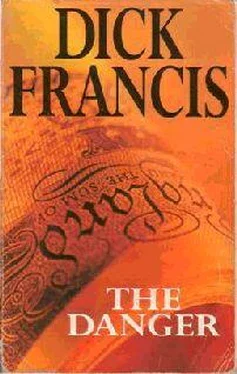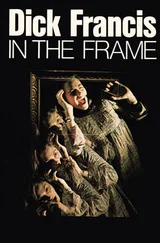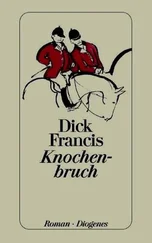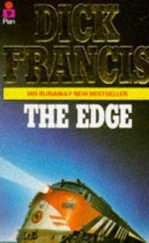I looked at her in silence.
'Do you understand?' she said. 'The Jockey Club are just people. Members. Of a club.'
'Rich members?' I asked.
Her mouth, half open, stopped moving.
'I'm afraid,' I said neutrally, 'that kidnappers usually couldn't care less where the money comes from or who it hurts. We'll get the demand down to far below ten million pounds, but it may still mean that contributions will be sought from racing people.' I paused. 'You didn't mention any threats. Were there any threats?'
She nodded slowly. 'If the ransom wasn't paid, Mr Freemantle would be killed.'
'Straight and simple?'
'He said… there would be another message later.'
'Which you haven't yet received?'
She glanced at a round-faced clock on a wall where the hands pointed to four-fifty.
'The call came through just after two,' she said. 'I told Colonel Tansing. He thought it might have been a hoax, so we telephoned to Washington. Mr Freemantle wasn't in his hotel. We got through to the public relations people who are looking after his trip and they said he hadn't turned up yesterday evening at a reception and they didn't know where he'd gone. Colonel Tansing explained about the ransom demand and they said they would tell Eric Rickenbacker - that's the president of the racecourse - and Mr Rickenbacker would get the police on to it straight away.'
'Was there any mention of not going to the police, on your ransom-demand call?'
She shook her head slowly. 'No.'
She had a firm, tidy-looking face with brown wavy hair greying at the sides: the sort of face that launched a thousand pony clubs and church bazaars, worthy, well-intentioned, socially secure. Only something of the present enormity could have produced her current rudderlessness, and even that, I judged, would probably transform to brisk competence very soon.
'Has anyone told the British police?' I asked.
'Colonel Tansing thought it best to contact your Chairman first,' she said, 'Colonel Tansing, you see, is…' She paused as if seeking for acceptable words. 'Colonel Tansing is the deputy licensing officer, whose job is mainly the registration of racehorse owners. No one of any seniority is here this afternoon, though they were this morning. No one here now really has the power to make top-level decisions. We're trying to find the Stewards… they're all out.' She stopped rather blankly. 'No one expects this sort of thing, you know.'
'No,' I agreed. 'Well, the first thing to do is to tell the police here and get them to put a tap on ail the Jockey Club's telephones, and after that to get on with living, and wait.'
'Wait?'
I nodded. 'While the ransom negotiations go on. I don't want to alarm you, but it may be some time before Mr Freemantle comes home. And what about his family? His wife? Has she been told?'
She said glumly, 'He's a widower.'
'Children?'
'He has a daughter,' she said dubiously, 'but I don't think they get on well. I believe she lives abroad… Mr Freemantle never mentions her.'
'And, excuse me,' I said, 'is Mr Freemantle himself… er… rich?'
She looked as if the question were in ultra-poor taste but finally answered, 'I have no idea. But anyone who becomes Senior Steward must be considered to have personal funds of some sort.'
Ten million?' I asked.
'Certainly not,' she said positively. 'By many standards he is moderate in his expenditure.' Her voice approved of this. 'He dislikes waste.'
Moderate spending habits and a dislike of waste turned up often enough in the most multi of millionaires, but I let it go. I thanked her instead and went in search of Colonel Tansing, who proved to be a male version of Mrs Berkeley, courteous, charming and shocked to near immobility.
In his office I telephoned the police and got things moving there and then asked him who was the top authority at the Jockey Club in Mr Freemantle's absence.
'Sir Owen Higgs,' he said. 'He was here this morning. We've been trying to reach him…' He looked slightly apprehensive. 'I'm sure he will agree we had to call you in.'
'Yes,' I said reassuringly. 'Can you arrange to record all calls on all your telephones? Separately from and in addition to the police?'
'Shall be done,' he said.
'We have a twenty-four hour service at Liberty Market, if you want us.'
He clasped my hand. 'The Jockey Club is one of the most effective organisations in Britain,' he said apologetically. 'This business has just caught us on the hop. Tomorrow everything will swing into action.'
I nodded and departed, and went back to the Liberty Market offices reflecting that neither the Colonel nor Mrs Berkeley had speculated about the victim's present personal sufferings.
Stunned disbelief, yes. Tearful sympathetic devotion; no.
***
Sir Owen Higgs having formally engaged Liberty Market's services, I set off to Washington the following morning, and by early afternoon, their time, was driving a rented car towards Laurel racecourse to talk to Eric Rickenbacker, its president.
The racecourse lay an hour's drive away from the capital city along roads ablaze with brilliant trees, golden, red, orange, tan - nature's last great flourish of trumpets before winter. The first few days of November: warm, sunny and windless under a high blue sky. The sort of day to lift the spirits and sing to. I felt liberated, as always in America, a feeling which I thought had something to do with the country's own vastness, as if the wide-apartness of everything flooded into the mind and put spaces between everyday problems.
Mr Rickenbacker had left instructions about me at the race-club entrance: I was to be conveyed immediately to his presence. Not so immediately, it transpired, as to exempt me from being stamped on the back of the hand with an ultraviolet dye, normally invisible to the eye but transformed to a glowing purple circular pattern under special lamps. My pass into the Club, it was explained: without it I would be stopped at certain doorways. A ticket one couldn't lose or surreptitiously pass to a friend, I thought. It would wash off, they said.
Mr Rickenbacker was in the president's domain, a retreat at the top of the grandstand, reached by elevator, hand-checks, a trudge through the Members' lounges, more checks, an inconspicuous doorway and a narrow stair. At the top of the stair, a guardian sitting at a table. I gave my name. The guardian checked it against a list, found it, ticked it, and let me through. I went round one more corner and finished the journey. The president's private dining room, built on three levels, looked out across the course through acres of glass, with tables for about a hundred people; but it was almost empty.
The only people in the place were sitting round one of the furthest tables on the lowest level. I walked over and down, and they looked up enquiringly at my approach. Six men, four women, dressed for tidy racing.
'Mr Rickenbacker?' I said generally.
'Yes?'
He was a big man with thick white hair, quite clearly tall even though sitting down. His eyes had the reflecting brilliance of contact lenses and his skin was pale and smooth, immensely well-shaven.
'I'm Andrew Douglas,' I said briefly.
'Ah.' He stood up and clasped my hand, topping me by a good six inches. 'These are friends of mine.' He indicated them with a small gesture but made none of the usual detailed introductions, and to them he said, 'Excuse me, everyone, I have some business with Mr Douglas.' He waved to me to follow him and led the way up deep-carpeted steps to a yet more private eyrie, a small room beyond, above, behind his more public dining room.
'This is a goddam mess,' he said forcefully, pointing me to an armchair. 'One minute Morgan was telling me about John Nerrity's troubles, and the next…" He moved his arms frustratedly. 'We've heard nothing ourselves from any kidnappers. We've told the police both here and in Washington of the ransom demand received in London, and they've been looking into Morgan's disappearance. How much do you know about that?'
Читать дальше












